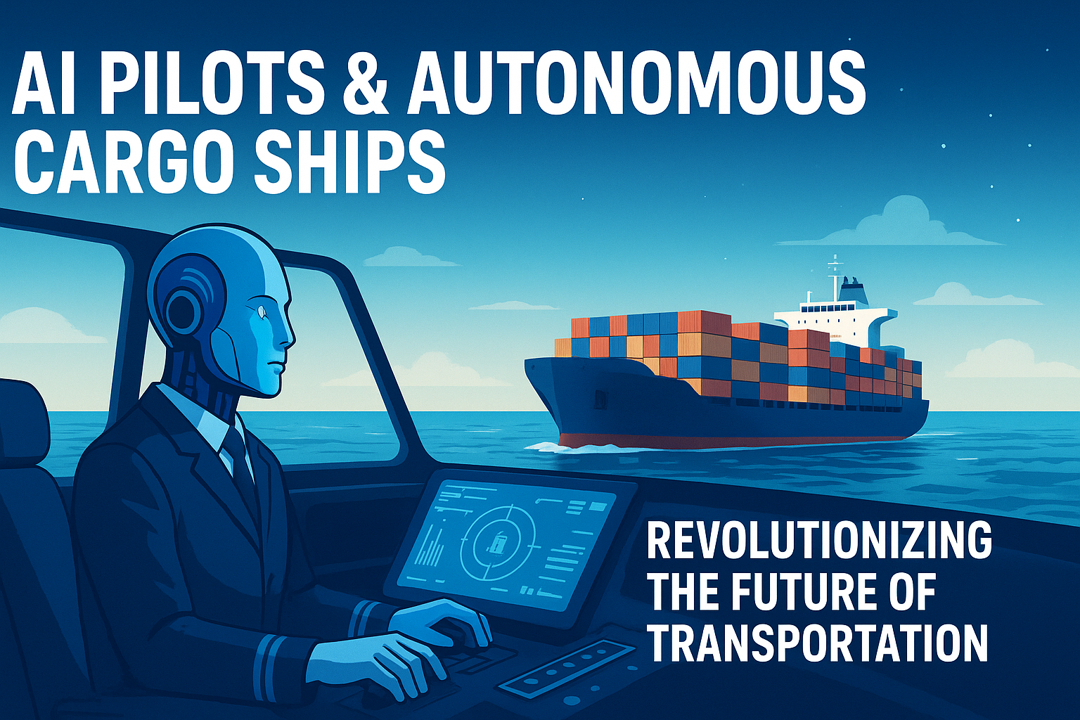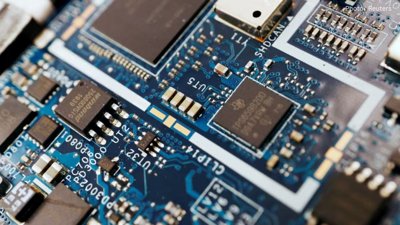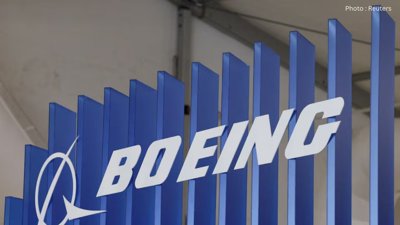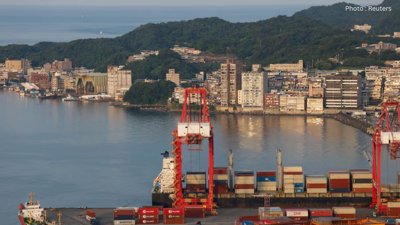
Post by : Meena Rani
The maritime industry has long been a cornerstone of global trade, responsible for moving over 80% of the world’s goods by volume. From bulk cargo to container shipping, maritime logistics fuels economies and connects continents. However, the shipping sector faces numerous challenges: rising operational costs, labor shortages, environmental regulations, and the pressing need for efficiency and safety.
Enter AI pilots and autonomous cargo ships — innovations poised to redefine the future of global transportation. By combining artificial intelligence, advanced sensors, and automation technologies, these innovations are reshaping maritime logistics like never before.
Autonomous cargo ships, sometimes called unmanned vessels, are equipped with advanced AI systems, sensors, and navigation technology that allow them to operate with minimal or no human intervention. These vessels range from fully autonomous ships capable of crossing oceans to semi-autonomous systems that assist crewed vessels with navigation, collision avoidance, and performance optimization.
AI pilots serve as the “brains” of these ships, analyzing real-time data from sensors, weather systems, and maritime traffic databases to make decisions traditionally handled by human captains. These systems can adjust speed, optimize fuel consumption, plot the safest routes, and detect hazards such as storms, obstacles, or other vessels.
AI pilots optimize routes to reduce travel time and fuel consumption. By analyzing sea currents, wind conditions, and port traffic, autonomous ships can cut unnecessary delays, translating into faster deliveries and lower operational costs. For example, Rolls-Royce’s autonomous ship trials in Northern Europe showed fuel savings of up to 10% compared to traditional navigation methods.
Maritime accidents are costly and sometimes deadly. Human error contributes to over 70% of shipping accidents worldwide. Autonomous systems reduce these risks by providing constant monitoring and predictive alerts. AI can detect obstacles, analyze collision risks, and make split-second decisions to avoid accidents. Drones and robotic inspection systems further enhance safety by performing hull inspections, detecting corrosion, or identifying maintenance issues without putting crew members at risk.
Autonomous ships contribute to sustainable shipping practices by optimizing fuel efficiency and reducing carbon emissions. AI algorithms manage engine performance, speed adjustments, and route planning to minimize environmental impact. With stricter international regulations on greenhouse gases, such technologies can help shipping companies comply with environmental standards.
Labor represents a significant portion of shipping expenses. While fully crewless ships are still experimental, AI-assisted automation reduces dependence on large crews. Smaller crews combined with autonomous operations can cut operational costs, reduce overtime, and streamline maintenance scheduling.
Norwegian company Yara International launched Yara Birkeland, the world’s first fully electric, autonomous cargo ship. This vessel can transport fertilizers along Norway’s coastline without traditional propulsion systems. With zero emissions and AI-assisted navigation, Yara Birkeland demonstrates how autonomous cargo ships can be sustainable and efficient.
Rolls-Royce has been at the forefront of autonomous ship technology, conducting trials with autonomous navigation systems on commercial vessels. Projects include remote-controlled cargo ships and AI navigation systems that integrate weather, traffic, and sensor data for safer voyages.
Major ports like Rotterdam and Singapore are integrating AI pilots into port operations. Autonomous ships communicate with port systems for efficient docking, loading, and unloading, reducing turnaround time and congestion.
International maritime law is still evolving to accommodate autonomous shipping. Questions about liability, insurance, and compliance with safety regulations must be addressed before fully autonomous vessels can operate globally.
Autonomous ships rely heavily on digital communication and AI systems, making them vulnerable to cyberattacks. Hackers could disrupt navigation, steal cargo data, or commandeer vessels. Strong cybersecurity protocols are essential to safeguard operations.
While autonomous ships can navigate open waters, ports and docking facilities must also adapt. Smart ports with automated cranes, AI-guided mooring systems, and integrated data networks are necessary to fully realize the benefits of autonomous shipping.
Crewless ships may face skepticism from industry stakeholders, regulators, and the public. Trust in AI systems for safe and reliable transport will take time to build, especially for high-value or hazardous cargo.
Autonomous cargo ships could redefine global supply chains:
By 2035, experts predict a significant percentage of global cargo will be transported on partially or fully autonomous vessels, supported by AI pilots and smart logistics systems.
Autonomous ships can be part of a fully integrated logistics ecosystem, linking maritime transport with autonomous trucks, drones, and rail systems. This multimodal approach creates a seamless, intelligent supply chain from port to doorstep.
The age of AI pilots and autonomous cargo ships marks a new era in global transportation. These technologies promise efficiency, safety, sustainability, and cost-effectiveness, fundamentally reshaping maritime logistics. While challenges around regulation, cybersecurity, infrastructure, and public trust remain, the trajectory is clear: autonomous shipping is not a futuristic concept — it is already underway.
For shipping companies and global trade stakeholders, embracing AI-driven autonomy today is not just a competitive advantage; it is a necessity for staying relevant in an increasingly digital and interconnected world. As AI continues to evolve and maritime technology advances, the shipping industry is set to become smarter, safer, and more sustainable than ever before.
#AIPilots #AutonomousShips #SmartShipping #MaritimeInnovation #FutureOfTransportation










Advances in Aerospace Technology and Commercial Aviation Recovery
Insights into breakthrough aerospace technologies and commercial aviation’s recovery amid 2025 chall

Defense Modernization and Strategic Spending Trends
Explore key trends in global defense modernization and strategic military spending shaping 2025 secu

Tens of Thousands Protest in Serbia on Anniversary of Deadly Roof Collapse
Tens of thousands in Novi Sad mark a year since a deadly station roof collapse that killed 16, prote

Canada PM Carney Apologizes to Trump Over Controversial Reagan Anti-Tariff Ad
Canadian PM Mark Carney apologized to President Trump over an Ontario anti-tariff ad quoting Reagan,

The ad that stirred a hornets nest, and made Canadian PM Carney say sorry to Trump
Canadian PM Mark Carney apologizes to US President Trump after a tariff-related ad causes diplomatic

Bengaluru-Mumbai Superfast Train Approved After 30-Year Wait
Railways approves new superfast train connecting Bengaluru and Mumbai, ending a 30-year demand, easi